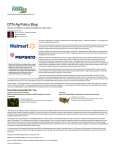Mississippi to consider soda tax
Although obesity is a problem across the United States, Mississippi has the greatest prevalence, with 32.8 percent of the state’s population considered to be obese in 2008, according to figures from the Centers for Disease Control and Prevention.
The rising incidence of obesity – along with the mounting cost of healthcare for obesity-related diseases like diabetes and cardiovascular disease – have put pressure on government to find a solution, and taxing sugary soft drinks is one idea that has been the subject of intense debate nationwide.
In the Mississippi bill’s current form, the tax would affect wholesalers, but John Mayo, who created the bill, has acknowledged that the tax would be passed on to consumers.
According to a report in the Clarion Ledger, the tax has been closely modeled on the Arkansas soda tax that has been in place since 1992, levying a two-cent duty on every 12-ounces of soda.
In the national debate on the idea, there are those who think taxes on soda make sense, pointing to studies that have shown moderately lower obesity rates in states that tax soft drinks, and that beverages now contribute 10 to 15 percent of calories consumed by children and adolescents. Many draw a parallel with tobacco, saying that imposing high taxes has been one of the biggest factors in reducing its use, so taxing soda could have a similar effect.
Others dismiss the idea as government meddling, and argue that a tax on soft drinks unfairly penalizes responsible, healthy consumers.
The American Beverage Association, for example, dubbed the idea of a soda tax in New York as “sweeping” and “regressive” and said it was an attack on ordinary, hardworking Americans. The tax was later rejected.

















